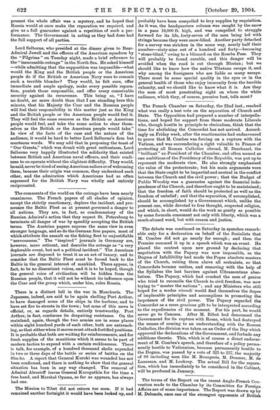The debate was continued on Saturday in speeches remark- able
only for a declaration on behalf of the Socialists that M. Combes did not go nearly far enough ; and then the Premier summed it up in a speech which was an event. He placed the contest upon new ground by declaring that negotiation with the Papacy was now impossible, as the Dogma of Infallibility had made the Popes absolute masters of the Church, raising them above all restraints, so that Concordats became useless, and removing with the help of the Syllabus the last barriers against Ultramontane abso- lutism. The Papacy, which had crushed the men of genius who tried to reconcile the Church to civil freedom, was now trying to " master the nations " ; and any Ministers who still hoped for a modus vivendi would find themselves the dupes of implacable principles and accomplices in promoting the impotence of the civil power. The Papacy regarded the Concordat as a mere gracious gift to be interpreted according to the expediencies of the moment. For his part, he would never go to Canossa. After M. Ribot had denounced the Government for its rupture with Rome, which had destroyed the means of coming to an understanding with the Roman Catholics, the division was taken on an Order of the Day which approved the declarations of the Government, and forbade any additions thereto. This, which is of course a direct endorse- ment of M. Combes's speech, and therefore of a policy perma- nently hostile to Vaticanism, because permanently hostile to the Dogma, was passed by a vote of 325 to 237, the majority of 88 including men like M. Bourgeois, M. Doumer, M. de Lanessan, and M. Lockroy. The actual Bill for the separa- tion, which has immediately to be considered in the Cabinet, will be produced in January.


















































 Previous page
Previous page